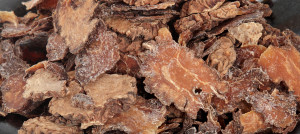Lovage is a plant. The root and underground stem (rhizome) are used to make medicine.
Contents
Uses
Lovage is used as “irrigation therapy” for pain and swelling (inflammation) of the lower urinary tract, for prevention of kidney stones, and to increase the flow of urine when urinary tract infections or fluid retention is present.
Lovage is also used for indigestion, heartburn, stomachbloating, intestinal gas, irregular menstrual periods, sore throat, boils, yellowed skin (jaundice), malaria, fluid around the lung (pleurisy), gout, joint pain (rheumatism), and migraine headaches. It is also used as an expectorant to loosen phlegm in respiratory conditions.
In foods and beverages, lovage is used as a flavor component.
In manufacturing, lovage is used as a fragrance in soaps and cosmetics.
Benefits
It has an agreeable aromatic smell. As a result, it was once used as spice called Ligusticum incense by ancients, according to “Compendium of Materia Medica”, written by Li Shizhen. In addition, it has a lot of health benefits, in particular its healing property for parietal headache. Actually this herb is the must-have ingredient in curing parietal headache formulas. As one of medical herbs with awesome healing properties, the uses for lovage are much wider over time. Actually for easier applications, today it has been made into lovage root tea, powder, extract, essential oil, tincture, and more. So, what make it with that amazing healing property? And modern pharmacology has something to tell.
Cautions
Lovage is POSSIBLY SAFE for most people. It might increase sensitivity to the sun, especially with long-term use. This might put you at greater risk for rashes from the sun, sunburns, and skin cancer. Wear sunblock and protective clothing outside, especially if you are light-skinned.
Special Precautions & Warnings:
Pregnancy and breast-feeding: Lovage is LIKELY UNSAFE during pregnancy. There are some reports that it might cause the uterus to contract or start the menstrual period. This could cause a miscarriage.
Not enough is known about the safety of using lovage during breast-feeding. Stay on the safe side and avoid use.
Fluid retention (edema): Don’t try “irrigation therapy,” which is the use of a mild diuretic such as lovage with lots of fluids to increase urine flow, if you retain fluid because of heart disease or kidney disease.
High blood pressure: There is a concern that lovage might increase the amount of sodium in the body, and that might increase blood pressure.
Kidney problems: Do not use lovage if you have inflamed or painful kidneys or damaged kidney function
Interactions
Water pills (Diuretic drugs) interacts with LOVAGE
Lovage seems to work like “water pills” by causing the body to lose water. Taking lovage along with other “water pills” might cause the body to lose too much water. Losing too much water can cause you to be dizzy and your blood pressure to go too low.
Some “water pills” include chlorothiazide (Diuril), chlorthalidone (Thalitone), furosemide (Lasix), hydrochlorothiazide (HCTZ, Hydrodiuril, Microzide), and others.
Other names
Ache des Montagnes, Angelica levisticum, Angélique de Montagne, Apio de Monte, Céleri Perpétuel, Herbe à Maggi, Hipposelinum levisticum, Lavose, Levistici Radix, Levístico, Levisticum officinale, Lévistique Officinale, Ligusticum levisticum, Livèche, Love Parsley, Maggi Plant, Persil d’Amour, Sea Parsley, Smallage, Smellage, Szechuan Lovage
References
Source: WebMD, http://www.webmd.com/vitamins-supplements/ingredientmono-725-lovage.aspx?activeingredientid=725&activeingredientname=lovage
ChineseHerbsHealing, http://www.chineseherbshealing.com/lovage-root/

